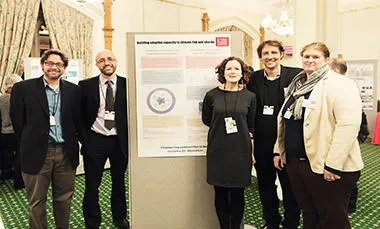19 February 2018
Geography with Impact: House of Commons Launch
The Department of Geography held a well-attended reception at the Houses of Parliament to celebrate the contribution of geography at King's to policy and decision-making.

The Department of Geography held a well-attended reception at the Houses of Parliament on the evening of Tuesday 6 February, hosted by Stephen Timms MP. The purpose of the reception was to celebrate and showcase the contribution of geography at King's to policy and decision-making.
Short talks, including from Mr Timms and Laura Sandys, Deputy Chair of the Food Standards Agency, were followed by parallel round-table discussions discussing the latest geographical research on topics including inequality and housing; London’s housing crisis; King’s Water; earth observation and spatial policy.
Dr Mark Mulligan, Head of Department, said: 'It is crucial that policy-relevant research has the opportunity to influence those who might benefit from knowing about and using it. The Department of Geography's research event at the House of Commons connected - or reconnected - a range of the Department's research with those in government, industry, NGOs and elsewhere who might benefit from it. The event was well attended and a real buzz of excitement was to be heard around each of the stands displaying existing or newly launched research. It was great to be able to see, in one place such a broad sample of the Department's policy relevant research.'
Geographers at King’s conduct research in nearly half of the world’s 200 countries, at scales from the local to the global, from villages to cities, advancing knowledge in the service of society. The reception was a celebration of the contribution of King's geographers and an opportunity to showcase their work. A new booklet, 'Research impact: Case studies from around the world', launched at the reception, illustrates how the knowledge generated by colleagues in geography at King's makes a difference to the world around us. The case studies were compiled, and the booklet produced, by Randa Kachef, PhD candidate in the department.
In a preface to the booklet, Ian Boyd, Chief Scientific Adviser to the Department of Environment, Food and Rural Affairs (Defra), praises the contribution that academic research makes to evidence-informed policy-making, recognising the case-study booklet as an 'invaluable tool' to demonstrate the value of academic research in the real world.
The 15 case studies include the contribution made to improving UK health and safety regulation by a 2011 independent review by Professor Ragnar Löfstedt; the King's Water initiative led by Dr Naho Mirumachi; and extensive research by Professor Terry Dawson to support a successful campaign to designate the waters around the Pitcairn Islands as a Marine Protected Area.
Also launched at the event was the third version of the Co$ting Nature ecosystem services mapping and scenario tool, along with the low-cost environmental monitoring designs of the FreeStation Project. Co$ting Nature is currently used by 1,200 organisations across 141 countries to map conservation priority and ecosystem service supply and demand. Version three increases the number of ecosystem services mapped from four to 12 and includes an ecosystem service economic valuation component developed with the IIED. FreeStation meanwhile, uses open source hardware, software and 3D-printing technology to make climate monitoring accessible to anyone with a workbench and a soldering iron, particularly useful to those in low income countries.
